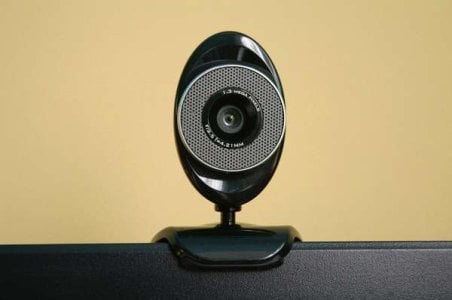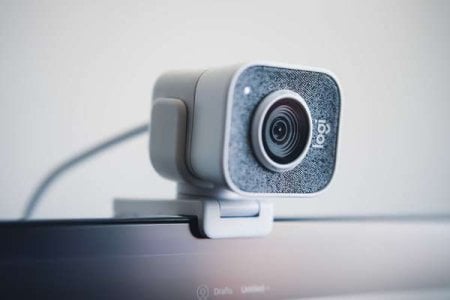Are you being watched through your webcam? 5 alarming signs you shouldn't ignore!
In today's tech-driven world, we're surrounded by endless wonders and potential pitfalls in today's tech-driven world in today's tech-driven world.
While we might enjoy some good old-fashioned storytelling, we're also well aware of the challenges of navigating the vast world wide web.
But even those well-versed in the digital lingo must stay vigilant, especially when it comes to something as intrusive as a compromised webcam.

To assist you in standing guard against such intrusions, let us delve into the signs that indicate your webcam might be compromised.
1. Pesky webcam light glowing uninvited
Is your webcam light acting strangely, flashing like a disco show?
If you notice it randomly blinking while your camera is supposed to be off, it's essential to pay attention.
Your webcam's indicator is like a watchful guard, letting you know when the camera is active.
If it unexpectedly turns on, it could mean there are unauthorised users or potential intruders trying to access your device.
2. Random icons and unfamiliar programs popping up
Do you ever come across unfamiliar icons or programs on your computer?
Brace yourself, as there might be another cause for concern.
Those unfamiliar icons and unwanted software could be traces left behind by digital intruders aiming to gain unauthorised access through your webcam.
3. Unwanted pop-ups and documents in your files
If you suddenly see unfamiliar pop-ups and files instead of your carefully organised folders, it's time to sound the alarm.
This unexpected change could indicate a potential security breach.
4. Friends receiving odd messages or emails from you
If your friends or family members are receiving cryptic messages or emails seemingly sent from you, it's more than just a case of accidental messages or harmless pranks.
This situation could indicate a serious security breach, and your webcam being at risk might be the least of your worries.
It's possible that a hacker has gained access to your account and is using it for shady activities.
5. Unusual browser extensions
If you notice that your webcam light turns on unexpectedly when you open your browser, it could be a clear sign that a malicious browser extension or software is accessing your webcam without your knowledge or consent.

To prevent hackers from accessing your webcam, here are some effective measures you can take:
Webcam cover:
Consider using a webcam cover that can easily slip onto your laptop or other devices.
It provides a physical barrier to block the camera when not in use without damaging it with sticky substances.
Keep software updated:
Regularly update your operating system, webcam drivers, and applications, especially video conferencing software.
Updates often include security patches that address known vulnerabilities.
Use a reliable antivirus and firewall:
Install reputable antivirus software and enable a firewall on your computer to protect against malware and unauthorised access.
Enable two-factor authentication (2FA):
Whenever possible, enable 2FA on your accounts, especially on platforms that use your webcam.
This adds an extra layer of security by requiring a second form of verification beyond just your password.
Review app permissions:
Regularly review the permissions granted to applications on your device, especially video-related apps.
Only permit apps that genuinely need access to your webcam, such as official video chat programs.
Use a virtual private network (VPN):
Consider using a trustworthy VPN to encrypt your internet traffic and add an extra layer of security to your online activities, including video conferencing.
Avoid suspicious links and downloads:
Be cautious about clicking on links or downloading files from unknown or untrusted sources, as they may contain malware that could compromise your webcam.
Stay off public Wi-Fi:
Public Wi-Fi networks are less secure, making it easier for hackers to intercept data, including webcam streams.
Avoid using your webcam on public networks for sensitive activities.
By following these preventative measures, you can significantly reduce the risk of your webcam being compromised and protect your privacy and security online.

Armed with knowledge, we can enjoy technology safely and securely.
Members, have you encountered any attempts at webcam intrusions or hacking? If so, how did you respond, and what measures did you take to strengthen your device's security?
While we might enjoy some good old-fashioned storytelling, we're also well aware of the challenges of navigating the vast world wide web.
But even those well-versed in the digital lingo must stay vigilant, especially when it comes to something as intrusive as a compromised webcam.

Hackers can access webcams through various methods, such as exploiting software vulnerabilities, tricking users into downloading malicious software, or remotely accessing devices with weak security measures like default passwords. Image by Aksa2011 from pixabay
To assist you in standing guard against such intrusions, let us delve into the signs that indicate your webcam might be compromised.
1. Pesky webcam light glowing uninvited
Is your webcam light acting strangely, flashing like a disco show?
If you notice it randomly blinking while your camera is supposed to be off, it's essential to pay attention.
Your webcam's indicator is like a watchful guard, letting you know when the camera is active.
If it unexpectedly turns on, it could mean there are unauthorised users or potential intruders trying to access your device.
2. Random icons and unfamiliar programs popping up
Do you ever come across unfamiliar icons or programs on your computer?
Brace yourself, as there might be another cause for concern.
Those unfamiliar icons and unwanted software could be traces left behind by digital intruders aiming to gain unauthorised access through your webcam.
3. Unwanted pop-ups and documents in your files
If you suddenly see unfamiliar pop-ups and files instead of your carefully organised folders, it's time to sound the alarm.
This unexpected change could indicate a potential security breach.
4. Friends receiving odd messages or emails from you
If your friends or family members are receiving cryptic messages or emails seemingly sent from you, it's more than just a case of accidental messages or harmless pranks.
This situation could indicate a serious security breach, and your webcam being at risk might be the least of your worries.
It's possible that a hacker has gained access to your account and is using it for shady activities.
5. Unusual browser extensions
If you notice that your webcam light turns on unexpectedly when you open your browser, it could be a clear sign that a malicious browser extension or software is accessing your webcam without your knowledge or consent.

Once access is obtained, hackers can covertly control and monitor the webcam, potentially invading the user's privacy and compromising sensitive information. Image by emilianocicero from unsplash
To prevent hackers from accessing your webcam, here are some effective measures you can take:
Webcam cover:
Consider using a webcam cover that can easily slip onto your laptop or other devices.
It provides a physical barrier to block the camera when not in use without damaging it with sticky substances.
Keep software updated:
Regularly update your operating system, webcam drivers, and applications, especially video conferencing software.
Updates often include security patches that address known vulnerabilities.
Use a reliable antivirus and firewall:
Install reputable antivirus software and enable a firewall on your computer to protect against malware and unauthorised access.
Enable two-factor authentication (2FA):
Whenever possible, enable 2FA on your accounts, especially on platforms that use your webcam.
This adds an extra layer of security by requiring a second form of verification beyond just your password.
Review app permissions:
Regularly review the permissions granted to applications on your device, especially video-related apps.
Only permit apps that genuinely need access to your webcam, such as official video chat programs.
Use a virtual private network (VPN):
Consider using a trustworthy VPN to encrypt your internet traffic and add an extra layer of security to your online activities, including video conferencing.
Avoid suspicious links and downloads:
Be cautious about clicking on links or downloading files from unknown or untrusted sources, as they may contain malware that could compromise your webcam.
Stay off public Wi-Fi:
Public Wi-Fi networks are less secure, making it easier for hackers to intercept data, including webcam streams.
Avoid using your webcam on public networks for sensitive activities.
By following these preventative measures, you can significantly reduce the risk of your webcam being compromised and protect your privacy and security online.
Key Takeaways
- Five signs your webcam may be hacked include: the webcam light illuminating when you're not using it, odd icons or unfamiliar programs on your desktop, sudden pop-ups and unexpected documents in your files, friends receiving strange messages or emails from you, and browser extensions appearing that you did not install.
- Precautions to prevent hackers from accessing your webcam include using a camera cover, keeping your software updated, having reliable antivirus software and firewall, enabling two-factor authentication, regularly reviewing the applications' permissions, and using a reliable virtual private network.
- It's recommended to avoid clicking on dubious links or downloading files from unknown sources, as these might contain malware that could compromise your webcam.
- Avoid using your webcam on public Wi-Fi networks for sensitive activities, as these networks tend to be less secure, making it easier for hackers to intercept data, including webcam streams.
Armed with knowledge, we can enjoy technology safely and securely.
Members, have you encountered any attempts at webcam intrusions or hacking? If so, how did you respond, and what measures did you take to strengthen your device's security?







